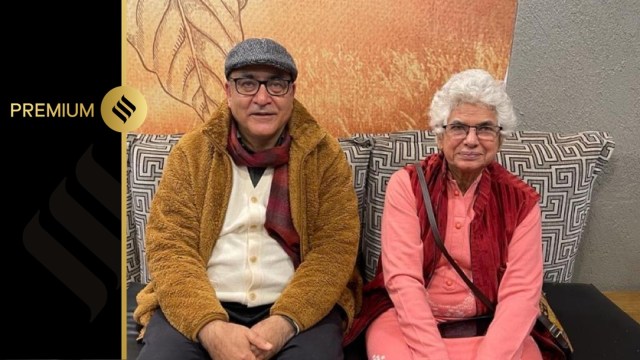Dr Saroj Chooramani Gopal is a woman of many firsts. The first woman post-graduate student of general surgery in her Agra college; the first Indian woman with a superspeciality in paediatric surgery; the first woman Vice-Chancellor of Lucknow’s King George’s Medical University.
At 79, she isn’t done yet. Dr Gopal is now back in the classroom, having enrolled for a PhD at IIT Kanpur on January 10. Her research, which she will now pursue at IIT Kanpur’s Biological Sciences and Bioengineering Department, will focus on how stem cells from a person’s bone marrow or abdominal lining can help in the regeneration of damaged spinal nerves, helping patients with spinal injuries or vertebral damage get back on their feet.

During her long and illustrious career, Dr Gopal has developed new techniques in paediatric surgery and devised low-cost innovations to make treatments accessible to the poor – among them, a new stent for hydrocephalus (buildup of fluid in the brain) and a humidifier for babies. She is a recipient of the Padma Shri as well as the country’s highest recognition for physicians, the Dr BC Roy Award.
Story continues below this ad
It was her years as a postgraduate student at Agra’s Sarojini Naidu Medical College that triggered Dr Gopal’s interest in regenerative medicine. She said, “I remember this baby born with a condition called meningomyelocele — a condition where the spinal cord of the baby is damaged at the time of birth. It was clear to us that the baby would not be able to walk or control bowel movements. When I asked my senior what we could do for the child, he said there was absolutely nothing that could be done. I was determined then to find a way out for children like that.”
While the case sparked her curiosity in cutting-edge global research in regenerative medicine, she continued her medical training. In 1973, she completed her super-specialisation in paediatric surgery from AIIMS Delhi. “I became the first person to complete an MCh (super specialisation) in paediatric surgery. The course was simultaneously started at AIIMS New Delhi, PGI Chandigarh, KEM Mumbai, and Egmore Institute Chennai for one candidate each. While I completed my MCh in three years, the others took an extra year,” she said.
After her MCh, she joined Banaras Hindu University’s Faculty of Medicine as a lecturer (equivalent to assistant professor) and retired as Medical Superintendent and Dean in 2008.
During her early years at BHU, she proposed to carry out research on the use of stem cells for the regeneration of spinal nerves in children born with congenital defects. “But they rejected my proposal. It was only after I was appointed V-C at KGMU that I was able to get my project approved,” she said.
Story continues below this ad
At KGMU, in 2014-15, Dr Gopal was able to demonstrate that patients who were administered stem cells fared much better than those who underwent a surgery to stabilise the spine after an injury. But by then, her research focus had shifted. “Since I was so moved by the child I saw during my post-graduation days, I had hoped to carry out my research on children. But at KGMU, I remember there was a dedicated 30-bed ward for those who suffered from spinal injuries and were paralysed waist down. I thought, I have been worrying about children when my research can also help adults and other earning members of a family lead a better life.”
She soon started her research at KGMU – “there were at least four people in my trials who ended up being able to walk. It was unheard of”. After her V-C term, Dr Gopal returned to BHU as Professor Emeritus, where she hoped to complete her research, but the university didn’t have the specialised lab that her work required.
Years passed, until two years ago, Dr Gopal met Prof Ashok Kumar, her now supervisor, at a seminar organised by the National Academy of Medical Sciences, of which she was president. “At the session that day, Prof Kumar had delivered a lecture on the engineering aspect of regenerative medicine. I approached him and I told him about my long-pending dream of completing her research,” she said, attributing her determination to a trait she has had since she was young.
“When my family said girls can’t study medicine, I went on a five-day hunger strike till they agreed on the condition that I enroll in the Agra college that was the nearest to my home. Later, when I had the option of taking up either obstetrics and gynaecology or general surgery for my post-graduation, everyone said I should choose gynaecology because that’s what women did. I was denied a seat in general surgery that was traditionally meant for men. I fought. I took the matter to the admissions committee and said when men can study gynaecology, why can’t women study surgery?,” she said.
Story continues below this ad
Now, in her new role as a visiting professor at IIT Kanpur, Dr Gopal will also mentor other PhD students while working on her research.
Prof Kumar, who has been working on the biological engineering aspect of regenerative medicine at IIT Kanpur, said he was pleasantly surprised to see Dr Gopal’s enthusiasm for a PhD. “Ma’am has had such an extraordinary career that anybody would happily grant her an honorary doctorate. But she wanted to work on the project she is passionate about and actually earn it. The good thing is that in IITs, there is no age bar on research,” said Kumar, adding that Dr Gopal provides the crucial clinical aspects to his lab’s work.









